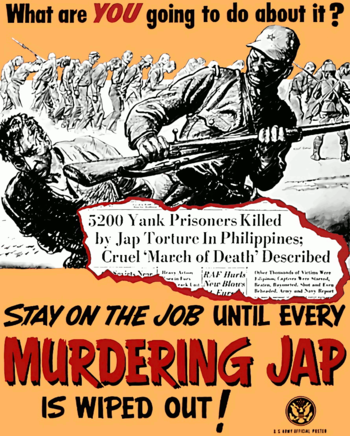 |
| Cover to the propaganda comic book "Is This Tomorrow"' (Photo credit: Wikipedia) |
 |
| English: "Remember December 7th" US Government propaganda poster of 1942. (Photo credit: Wikipedia) |
 |
| We Can Do It poster for Westinghouse, closely associated with Rosie the Riveter, although not a depiction of the cultural icon itself. Pictured Geraldine Doyle (1924-2010), at age 17. (Photo credit: Wikipedia) |
 |
| 'stay on the job until every murdering jap is wiped out!' World War II poster (Photo credit: Wikipedia) |
While most persons who give the matter a thought make distinctions between an objectively written news report and propaganda, they encounter difficulty when they try to define propaganda. It is one of the most troublesome words in the English language. To define it clearly and precisely, so that whenever it is used it will mean the same thing to everybody, is like trying to get your hands on an eel. You think you’ve got it-then it slips away.
To some speakers and writers, propaganda is an instrument of the devil. They look on the propagandist as a person who is deliberately trying to hoodwink us, who uses half-truths, who lies, who suppresses, conceals, and distorts the facts. According to this idea of the word, the propagandist plays us for suckers.
Others think especially of techniques, of slogans, catchwords, and other devices, when they talk about propaganda. Still others define propaganda as a narrowly selfish attempt to get people to accept ideas and beliefs, always in the interest of a particular person or group and with little or no advantage to the public. According to this view, propaganda is promotion that seeks “bad” ends, whereas similar effort on behalf of the public and for “good” ends isn’t propaganda, but is something else. Under this definition, for example, the writings of the patriotic Sam Adams on behalf of the American Revolution could not be regarded by American historians as propaganda.
The difficulty with such a view is that welfare groups and governments themselves secure benefits for a people through propaganda. Moreover, national propaganda in the throes of a war is aimed to bolster the security of the nonaggressor state and to assure the eventual well-being and safety of its citizens. No one would deny that this kind of propaganda, intelligently administered, benefits every man, woman, and child in the land.


No comments:
Post a Comment